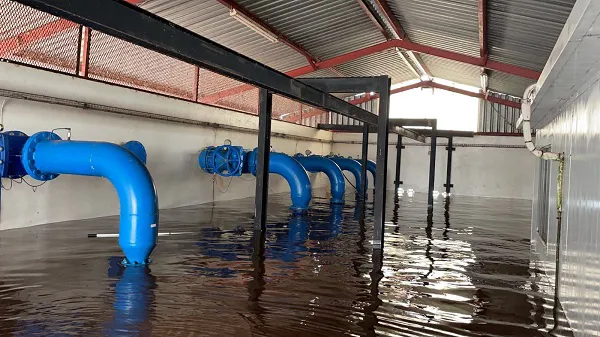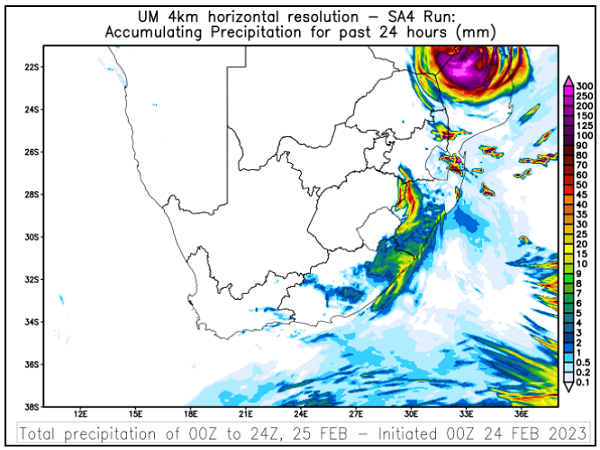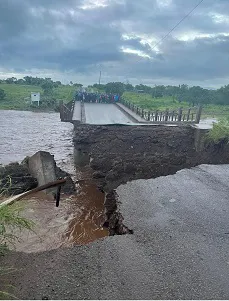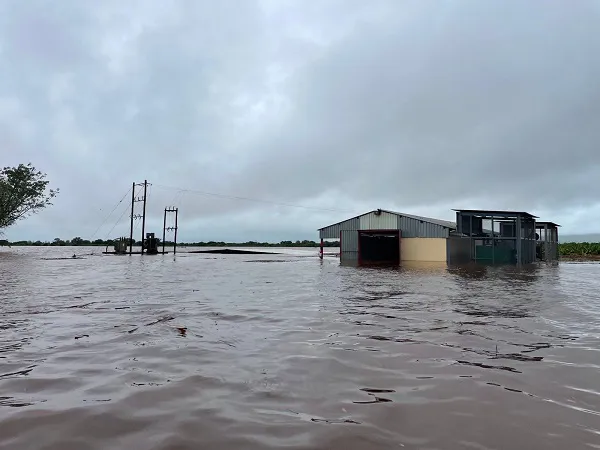Cyclone Freddy, now downgraded to a tropical storm, has had an unusually long life as it makes landfall between Vilankulos and Maxixe, with the provinces of Sofala and Inhambane in Mozambique. in its path.
The South African Weather Service reports that winds are currently between 89 and 117km/h and says the system is expected to decay overland, which should allay the fears among banana growers of high winds which could flatten already waterlogged banana plantations.
 Pumphouse under water on a Mozambican banana farm after heavy rains over the past weeks
Pumphouse under water on a Mozambican banana farm after heavy rains over the past weeks
"Residents of southern Mozambique are therefore urged to be acutely aware that a spell of torrential tropical rainfall and sustained windiness is likely to affect [them] throughout the coming weekend. Moreover, major rivers in southern Mozambique will soon be in flood, further exacerbating the situation," the national forecaster warns.
Heavy rains (40 to 70mm of rainfall) are predicted over the extreme northeast of South Africa this weekend.
The port of Beira has closed for the day in anticipation of Cyclone Freddy, as have schools in Zimbabwe.
Predicted 24-hour rainfall for Saturday, 24 February 2023. An area of extremely heavy rainfall, 200 to 300mm (indicated in shades of purple) is predicted for southern Mozambique. (Source: South African Weather Service, from Unified Model)
Avo producer: "We've dodged the bullet"
In Manica Province the avocado harvest is in full swing after being disrupted by a tropical storm two days ago, says an avocado producer near Chimoio, Manica Province.
“Today we’re harvesting flat-out,” he says. All of the avocados they harvest now are meant for export to Europe.
“We’ve dodged the bullet of Cyclone Freddy,” he remarks. “We have a beautiful sunny day with no wind. It’s more towns like Inhassoro and Vilankulos that will be affected.”
Banana growers fear high winds Towards the south of the country, in Maputo province, banana growers have already recently suffered significant infrastructural damage with the previous two weeks' cutoff low that came with disruptive rain and dams like the Pequenos Libombos dam that overflowed.
Towards the south of the country, in Maputo province, banana growers have already recently suffered significant infrastructural damage with the previous two weeks' cutoff low that came with disruptive rain and dams like the Pequenos Libombos dam that overflowed.
Several bridges in Mozambique and Eswatini were washed away, forcing trucks carrying bananas to South Africa to find an alternative to the Namaacha and the Lebombo border posts.
The Mozambican army engineering corps has reportedly been laying down bridges and fixing roads.
“All of our pump houses were under water and some pumps were submerged if you couldn't remove them in time,” says a banana grower. “We couldn’t get to our farms for three days.”
On banana farms workers are digging trenches along many kilometres to drain and divert water from the banana plantations. Mozambique is very flat, and with the recent rains some banana farms have been completely under water.
Banana plantations themselves have not suffered damage except for the higher risk of the Sigatoka fungus, usually not a severe problem, but with the recent rains keeping producers out of the lands aerial spraying is now done.

“The big thing that we’re now worried about, is if the cyclone brings high winds. The bananas are standing in waterlogged soil and it makes them more vulnerable and if we now get winds of 200 km/h it is going to flatten them. You can support it with overhead cables or poles but there’s not really anything you can do against such winds.”
Freddy was named by the Australian Bureau for Meteorology.
Eumetsat yesterday said that: “Long-lived tropical cyclone Freddy traversed more than 9,000km across the entire southern Indian Ocean in 17 days, starting on 5 February from the seas north of Australia, making landfall in Madagascar on 21 February. This long journey makes Freddy one of 5 in known history to set a record for track length in the southern Indian Ocean, noting that Freddy actually formed further east than the previous cyclones.”
